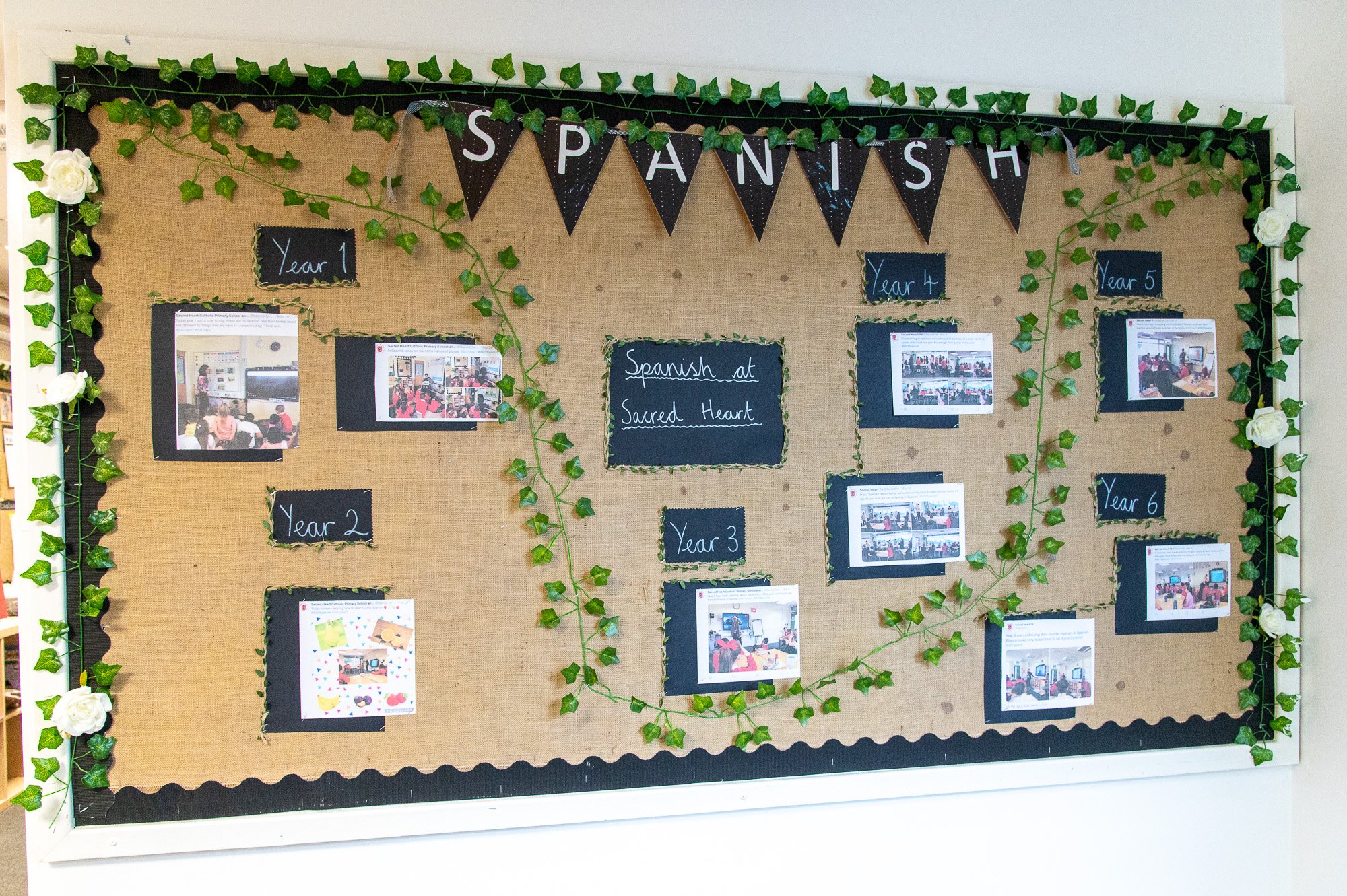
Spanish
Spanish
at Sacred Heart Primary School
Sacred Heart began teaching Spanish in 2017. Spanish was selected as it offered the best opportunities for our children for their future ambitions. We believe this is true today and the most beneficial for our children. It is the most widely spoken language internationally after English, is the language most likely to be used by our children (many of whom holiday in Spanish speaking countries) and offers continual progression into KS3.
Learning a foreign language is a necessary part of being a member of a multi-cultural society and provides an opening to other cultures. Our school is diverse in culture and language. At Sacred Heart Catholic Primary School, it is our intent to provide a high-quality languages education, which fosters children’s curiosity and deepens their understanding of the world. All pupils will be expected to achieve their full potential by encouraging high expectations and excellent standards in their foreign language learning. The teaching should enable children to express their ideas and thoughts in another language and to understand and respond to its speakers, both in speech and in writing. It should also provide opportunities for them to communicate for practical purposes, learn new ways of thinking and read great literature in the original language. Language teaching should provide the foundation for learning further languages, equipping children to study and work in other countries.
‘Learning a foreign language is a liberation from insularity and provides an opening to other cultures. A high quality languages education should foster pupils’ curiosity and deepen their understanding of the world.’
DFE, National Curriculum
Intent
At Sacred Heart Primary School, we are blessed to have such a diverse community with a myriad of pupils being able to speak various different languages. We foster and build on their language knowledge to teach them about Spanish in our school. We are able to immerse ourselves with Spanish culture and vocabulary in our lessons and we seek support from our families who have Spanish heritage who would like to come in and share their experiences with us.
In our school, we believe that the learning of a language provides our pupils with a valuable educational, social and cultural experience. It helps them to develop communication skills, including key skills in speaking, listening, reading and writing. The linguistic skills gained assist and lay foundations for further language learning as our pupils move through KS1 into KS2 and furthermore, KS3. We enjoy celebrating different cultures and our Spanish lessons give the pupils to share similarities from their own backgrounds and cultures, which continues to develop their language skills as they are describing and using specific vocabulary to share their understanding.
In KS1, we develop greetings, counting and key words to begin the pupils’ journey on learning to communicate in Spanish.
In KS2, children are taught Spanish through the four stages of progression following the Primary Languages Network (PLN) scheme. The School aims to follow up activities when appropriate outside of the language lesson such as daily greetings via welcoming, registration and home time.
Implementation
In KS2, children are taught in weekly sessions by a specialist teacher and our class teachers. We aim for our children to develop an appreciation of songs and stories in Spanish throughout their time at the school.
Our school follows the Primary Languages Network scheme of work, which is adapted to meet the needs of our own children. Spanish is taught through topics, age and stage appropriate, linking to the school calendar and times of the year to enable cross curricular links. The Primary Languages Network is adapted to support confident Spanish speakers to deliver creative lessons as well as enabling all class teachers to deliver exciting, focused lessons using sound clips and engaging resources. As we acknowledge children’s different learning styles, our children learn through active participation in actions, rhymes, stories, song, grammar focus, video clips, sentence structure, dictionary work, book making and many more creative ways to extend, embed and combine language skills.
Impact
Our Spanish curriculum will ensure all pupils develop key language learning skills, as set out by the national curriculum, as well as a love of languages and learning about other cultures. These are as follows:
understand and respond to spoken and written language from a variety of authentic sources
speak with increasing confidence, fluency and spontaneity, finding ways of communicating what they want to say, including through discussion and asking questions, and continually improving the accuracy of their pronunciation and intonation
write at varying length, for different audiences and purposes, using the variety of grammatical structures that they have learnt
discover and develop and appreciation of a range of writing in the language studied
The learning challenges used, to plan and teach Spanish, ensure that children are accessing work at age related expectations, with regular opportunities to be challenged through higher-level objectives. Children are assessed half termly, according to age related expectations in line with curriculum requirements, using the Primary Languages Network resources where appropriate. Children’s learning will be informally assessed through questioning, work in their books or folders and observations, as well as the child’s voice, and monitored throughout the year by the Subject Lead.
Our curriculum is carefully designed to ensure key knowledge and skills progress in a logical and sequenced way, thus enabling pupils to revisit previously taught content and to build upon it year on year. We use carefully structured progression documents to ensure that substantive and disciplinary knowledge and skills are clearly outlined and sequenced, thus enabling the children to know and remember more, as they move through school.
Overview and Progression Maps
